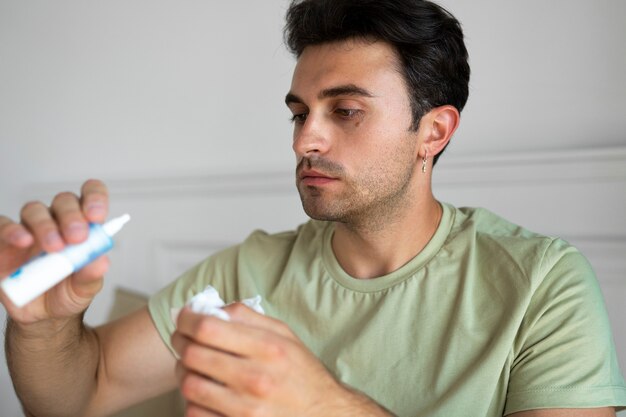Understanding Malaria: What You Need to Know
When you hear the term malaria, various images may spring to mind: the buzzing of mosquitoes, tropical climates, and the idea of a disease that's far removed from the Western world. But what exactly is malaria, and what does it mean for someone who contracts this illness? Let’s delve into a deeper understanding of malaria, its implications, and the steps to take when faced with this disease.
What is Malaria?
Malaria is a serious and sometimes fatal disease caused primarily by the Plasmodium parasites, which are transmitted to humans through the bites of infected mosquitoes. Though it's common in tropical and subtropical regions, malaria is a global concern due to international travel and urbanization.
The Culprit: Plasmodium Parasites
There are five species of Plasmodium that cause malaria in humans. Plasmodium falciparum is the most dangerous, accounting for the most severe symptoms and deaths globally. Knowing which species is prevalent in which region can help in strategizing prevention and treatment efforts.
Transmission Cycle
Understanding the transmission cycle of malaria is crucial. It starts when a female Anopheles mosquito bites someone already infected with malaria. When this mosquito bites another person, the parasites are introduced into the bloodstream, leading to infection.
This cycle highlights the importance of mosquito control and prevention measures in combating malaria.
Signs and Symptoms of Malaria
The symptoms of malaria can range from mild to life-threatening and usually appear 10-15 days after infection. Awareness of these symptoms is critical for early detection and treatment.
Common Symptoms
- Fever
- Chills and Sweats
- Headache
- Nausea and Vomiting
- Body Aches and Fatigue
Severe Symptoms
When left untreated, malaria can progress to severe illness which includes:
- Severe Anemia
- Cerebral Malaria (which can lead to neurological complications)
- Organ Failure
Prompt medical attention is vital once symptoms are identified to prevent severe complications.
Diagnosis of Malaria
Accurate diagnosis is crucial for effective malaria treatment.
Diagnostic Methods
- Microscopy - Visual identification of parasites in blood smears.
- Rapid Diagnostic Tests (RDTs) - These utilize antibodies to detect malaria antigens in a small blood sample.
- Polymerase Chain Reaction (PCR) - Used in research settings to detect low-grade infections.
Each method has its pros and cons, but their use will depend on availability and the specific healthcare setting.
Treatment Options
Once diagnosed, treating malaria promptly is essential. Antimalarial medications are prescribed based on the type and severity of the infection.
Antimalarial Drugs
- Artemisinin-based Combination Therapies (ACTs): These are currently the most effective treatments, particularly for Plasmodium falciparum.
- Chloroquine: Effective for non-resistant strains but is increasingly ineffective due to widespread resistance.
- Primaquine: Used for treating P. vivax and P. ovale to prevent relapse.
It's important that treatment is completed to ensure full recovery and minimize resistance development.
Prevention Strategies
Reducing mosquito bites is the frontline defense against malaria. Here are some effective prevention strategies:
Personal Protective Measures
- Insecticide-treated bed nets: These provide a protective barrier during sleep and reduce mosquito populations.
- Mosquito Repellents: Products containing DEET or picaridin are effective at repelling mosquitoes.
Environmental Control
- Indoor Residual Spraying (IRS): Spraying insecticides on walls provides months of protection from mosquitoes.
Chemoprophylaxis
For travelers, taking antimalarial drugs before, during, and after visiting malaria-endemic areas can reduce the risk of infection.
Malaria in Different Contexts
Understanding malaria's impact across different regions and populations is crucial. While malaria is more prevalent in certain geographical areas, globalization has caused shifts in how and where people encounter the disease.
Global Spread
Countries with warm climates, such as those located near the equator, are most affected. However, with increasing travel and migration, no place is entirely immune to malaria's reach.
Vulnerable Populations
Certain groups such as pregnant women, young children, and people with weakened immune systems are especially susceptible to severe malaria. Tailoring prevention strategies to protect these groups is vital.
Emerging Threats
Climate change and drug resistance present new challenges in the fight against malaria. Efforts are being made to stay ahead with innovative solutions such as genetic modification of mosquitoes and vaccine development.
Moving Forward: The Path to Eradication
Efforts to control and eventually eradicate malaria are ongoing. They require coordinated international cooperation and innovative solutions.
Research and Development
Scientific advances in vaccine development and novel drugs are promising aspects of modern malaria prevention efforts.
Community Engagement
Empowering local communities with knowledge and resources ensures sustainability. Community leaders can play a pivotal role in education and the implementation of preventive measures.
A Resilient Fight Against Malaria
Malaria remains a significant global health burden, but understanding its dynamics and how to combat it can empower individuals and communities. The global health community remains committed to reducing the incidence of malaria through research, preventive measures, and effective treatment strategies.
Key Takeaways 📝:
- Malaria is a global issue, primarily spread by Anopheles mosquitoes.
- Early diagnosis and treatment are critical to managing the disease.
- Prevention is the frontline strategy via bed nets, repellents, and environmental control.
- Research and innovation continue to provide hope in the fight against malaria.
- Community involvement is critical in implementing sustainable malaria control measures.
By staying informed and proactively engaging in preventive practices, we can collectively contribute to the fight against malaria.

